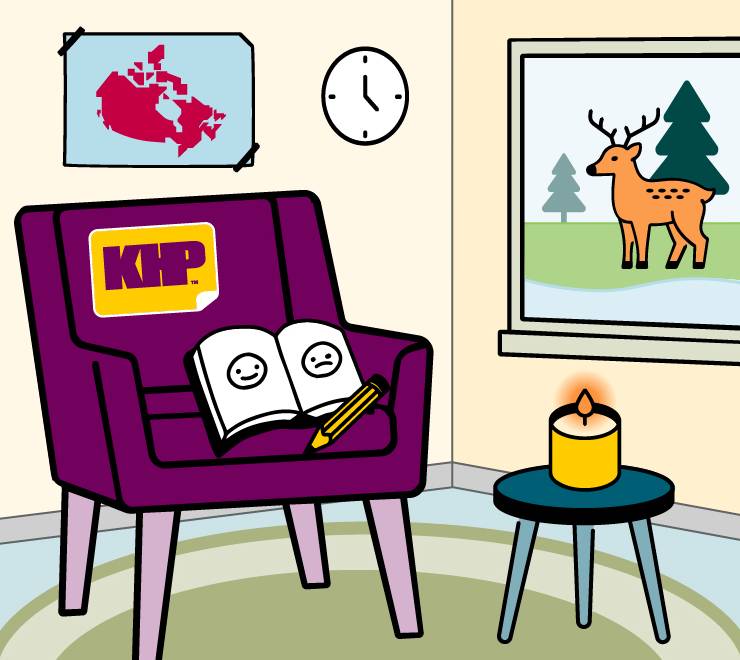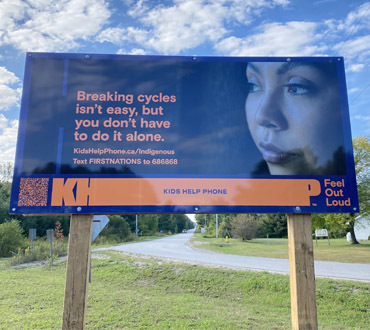You may have learned about magic mushrooms in a movie or from a friend, but have you ever wondered what they really are? Magic mushrooms are a mind-altering substance that can change how you see, hear, feel, taste and smell. They can also impact your thoughts and feelings. Here, Kids Help Phone shares facts about magic mushrooms to help you feel more confident and informed in the choices you make about substance use.
We’d like to let you know that this article is for information purposes only. If you have questions around magic mushrooms, substance use or anything else about your well-being, you can contact Kids Help Phone 24/7 for free, confidential support and / or connect with a health-care professional.
What are magic mushrooms?
Magic mushrooms are a group of fungi. They aren’t actually “magic,” and you can’t buy them at a grocery store like other mushrooms. Magic mushrooms are more difficult to find, and people usually access them illegally in Canada. They contain a mind-altering substance called psilocybin (info from the Government of Canada). Psilocybin is a chemical found in the cap and stem of over 200 different types of mushrooms. They belong to a category of drugs called hallucinogens (info from The Centre for Addiction and Mental Health), which are also called psychedelics.
Why do people use them?
People may use magic mushrooms:
- to boost their mood
- to cope with their emotions
- to treat a mental health disorder
- as a recreational (party) drug
- in religious / spiritual practices
- etc.
How do people use them?
There are different ways to use magic mushrooms. Some of these include:
- eating them, cooked or raw (dried)
- grinding them up to drink in a tea
- sniffing them in a powdered form
- swallowing them in pill form
Are magic mushrooms legal in Canada?
Magic mushrooms are illegal to grow, make, buy, sell or have in Canada without a license or special exemption.
There’s some interest in the use of magic mushrooms to treat mental health disorders. This is called psychedelic-assisted psychotherapy. For example, to support people experiencing a mental disorder who don’t feel better with other treatments, psilocybin may be used. This isn’t legal for everyone across Canada, though.
Only some health-care professionals have approval to offer psychedelic-assisted treatment. They’re often only able to offer it to select patients through things like clinical trials and Health Canada’s Special Access Program (SAP). If you have questions about the use of psychedelics for the treatment of mental health concerns, you can ask a health-care professional for more information.
How might magic mushrooms make me feel?
You may start to notice the effects of magic mushrooms 15–45 minutes after you’ve taken them. The effects can last between four and six hours.
People may experience different effects, depending on:
- how strong the dose is (i.e. how much psilocybin is in a mushroom)
- how much you take (i.e. how many mushrooms you have)
- how often you use them
- your mood, attitude and environment when using magic mushrooms
- your age
- whether you have any existing physical / mental health conditions
- whether you’ve also had alcohol / other drugs at the same time (including prescription medications)
People may experience mental / emotional effects when using magic mushrooms, such as:
- heightened emotions
- feeling happy / excited
- feeling creative
- laughing / giggling a lot
- seeing or hearing things that aren’t there (hallucinations)
- confusing senses (e.g. thinking you’re “seeing sounds” or “hearing colours,” etc.)
- feeling an altered sense of time (e.g. a minute may feel like an hour, etc.)
- changes in mood
- anxiety / panic attacks
- confusion
- disorientation
- fear / paranoia
- intense personal / spiritual awareness
People may experience physical effects when using magic mushrooms, such as:
- light-headedness
- clammy (sweaty) hands
- numbness
- an increased heart rate
- increased blood pressure
- dry mouth
- nausea / vomiting
- muscle weakness / twitching
- heightened reflexes
- sweating
- high body temperature followed by chills / shivering
- loss of urinary control
- lack of coordination
- dilated pupils
- diarrhea
Are magic mushrooms harmful?
If someone uses magic mushrooms, they may have changes in their awareness and judgment, which could lead to unwanted experiences including paranoia, risk-taking behaviours (that could lead to injuries) and even a false sense of self (thinking you’re something / someone you’re not). People often call these experiences a “bad trip.” If someone experiences a “bad trip,” they may have flashbacks (feeling like they’re reliving an experience) that continue for days, months or years afterward.
A person may experience unwanted side effects or a “bad trip” if they have:
- an existing mental health condition
- used alcohol or taken other drugs, including prescription medications
- a cardiac condition
Because magic mushrooms may alter your senses, driving is a risk while using them. There are also serious and possibly life-threatening health risks associated with injecting magic mushrooms.
Some mushrooms can also be poisonous, which could be harmful to you.If you’re thinking about using magic mushrooms, you can familiarize yourself with what you’re taking to try to avoid effects you don’t want.
It can be helpful to plan ahead before taking any substances. You can explore MindYourMind’s interactive tool to help you feel more prepared.
Can I get addicted to magic mushrooms?
There’s little evidence that people can become physically addicted to magic mushrooms. There are no known symptoms of withdrawal once you stop using them. Mental / emotional dependence can happen if a person feels like they need a drug, or like they can’t live without it. If you take magic mushrooms often, over time you could develop a higher tolerance, which means that the same amount of magic mushrooms may no longer give you the same effects anymore.
If you decide to use substances, you can learn how to take actions to put your safety first and reduce the risk of harm. It may also be helpful to learn about how to recognize a drug / alcohol overdose and be aware of the signs, symptoms and actions you can take to help ensure anyone around you is as safe as possible in the moment when using substances, too.
What is microdosing?
Microdosing of psychedelics, including magic mushrooms, is becoming popular in the media. You may have seen a documentary or read a news article about people who do it. Microdosing involves a person taking very low, “sub-hallucinogenic” doses (low enough doses to not affect the senses) of a psychedelic drug on a daily basis with the goal of boosting their mood. Researchers in Ontario are conducting studies to assess the benefits / risks of microdosing. You can learn more about this from The University of Toronto Mississauga’s Psychedelic Studies Research Program.
If you choose to use magic mushrooms, having the facts may help you make safer decisions in the process. If you’re concerned that you / someone you know is struggling with substance use, or you have more questions, you can search Resources Around Me for support services nearest you or connect with Kids Help Phone.













